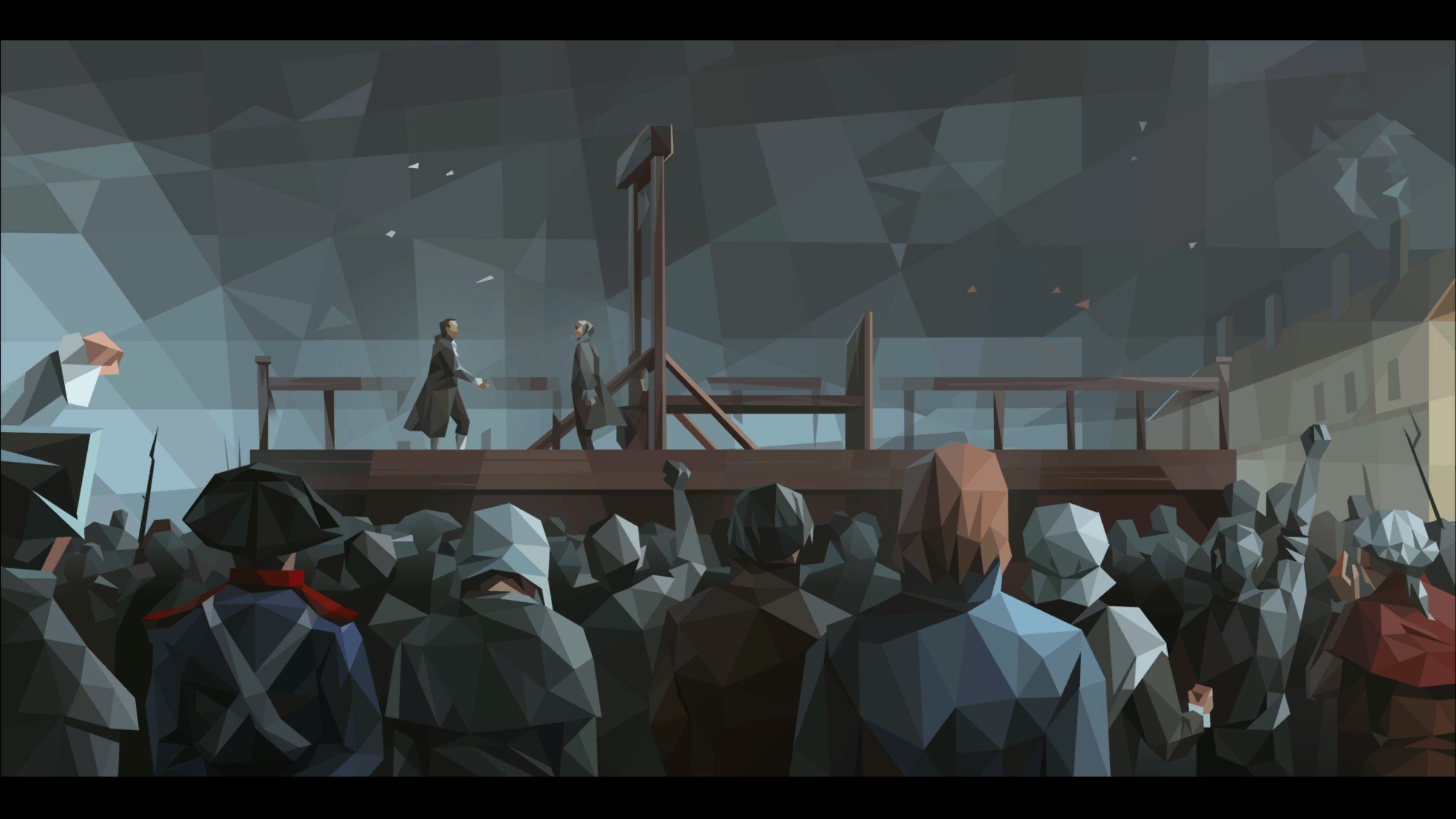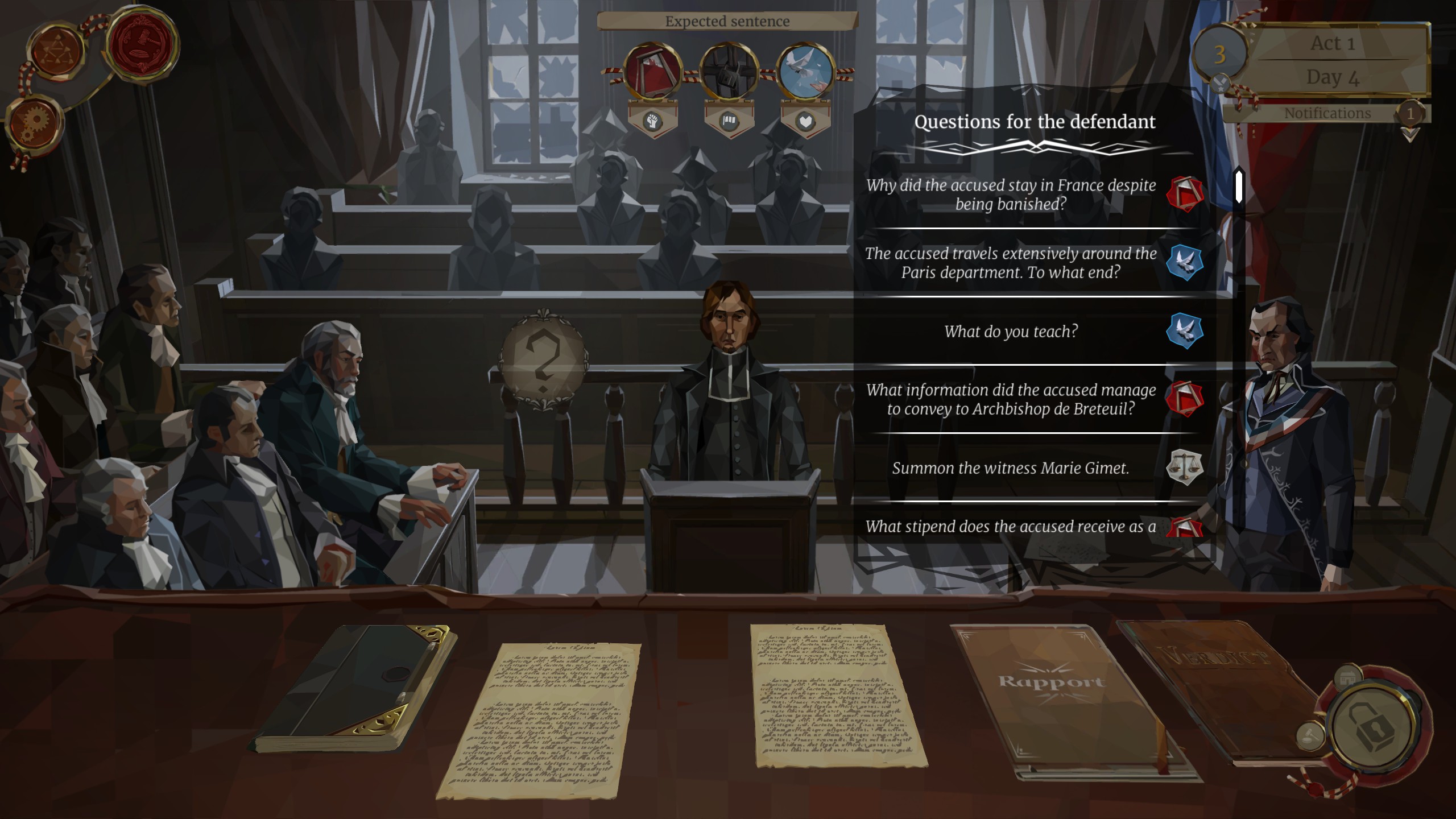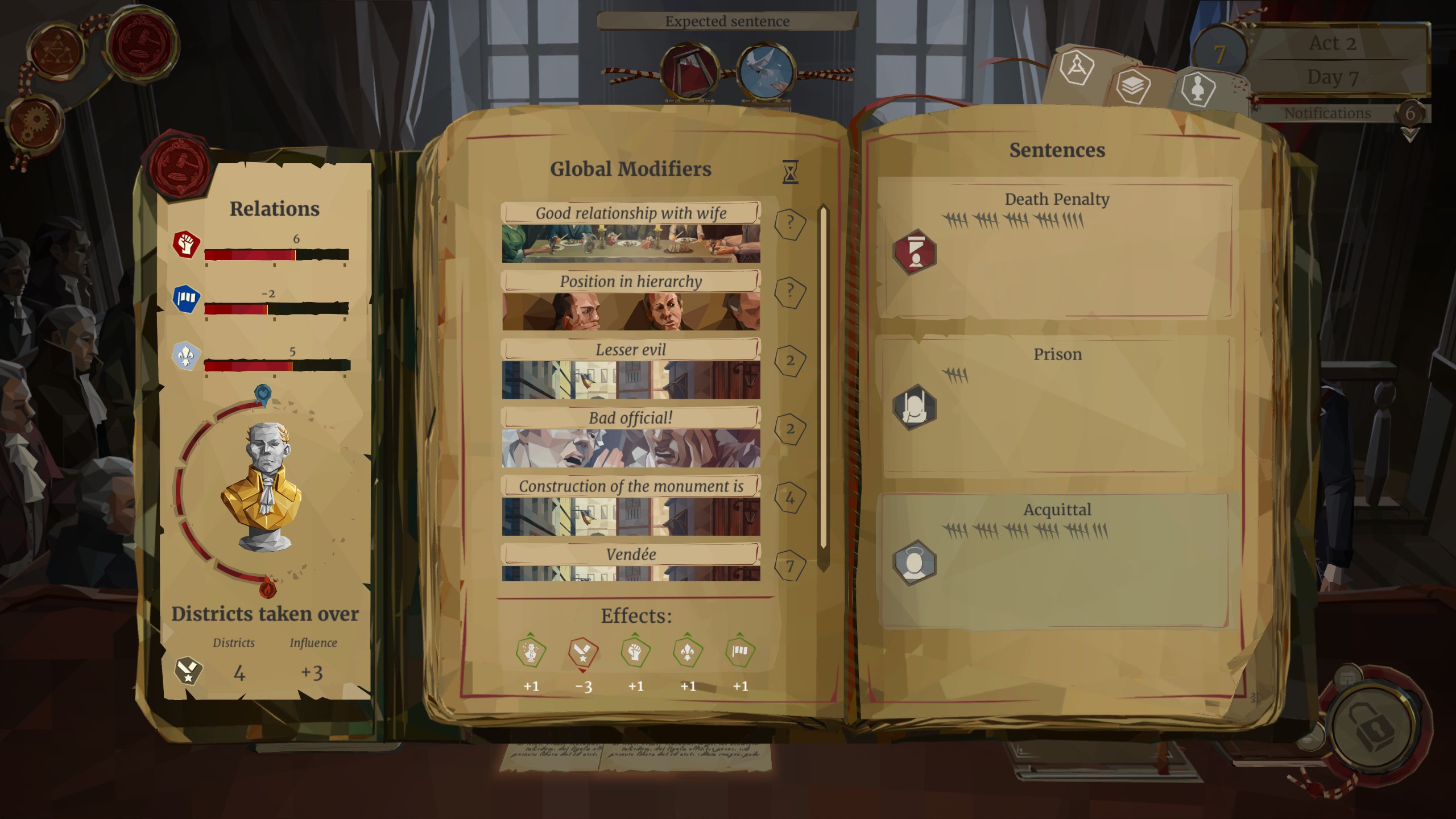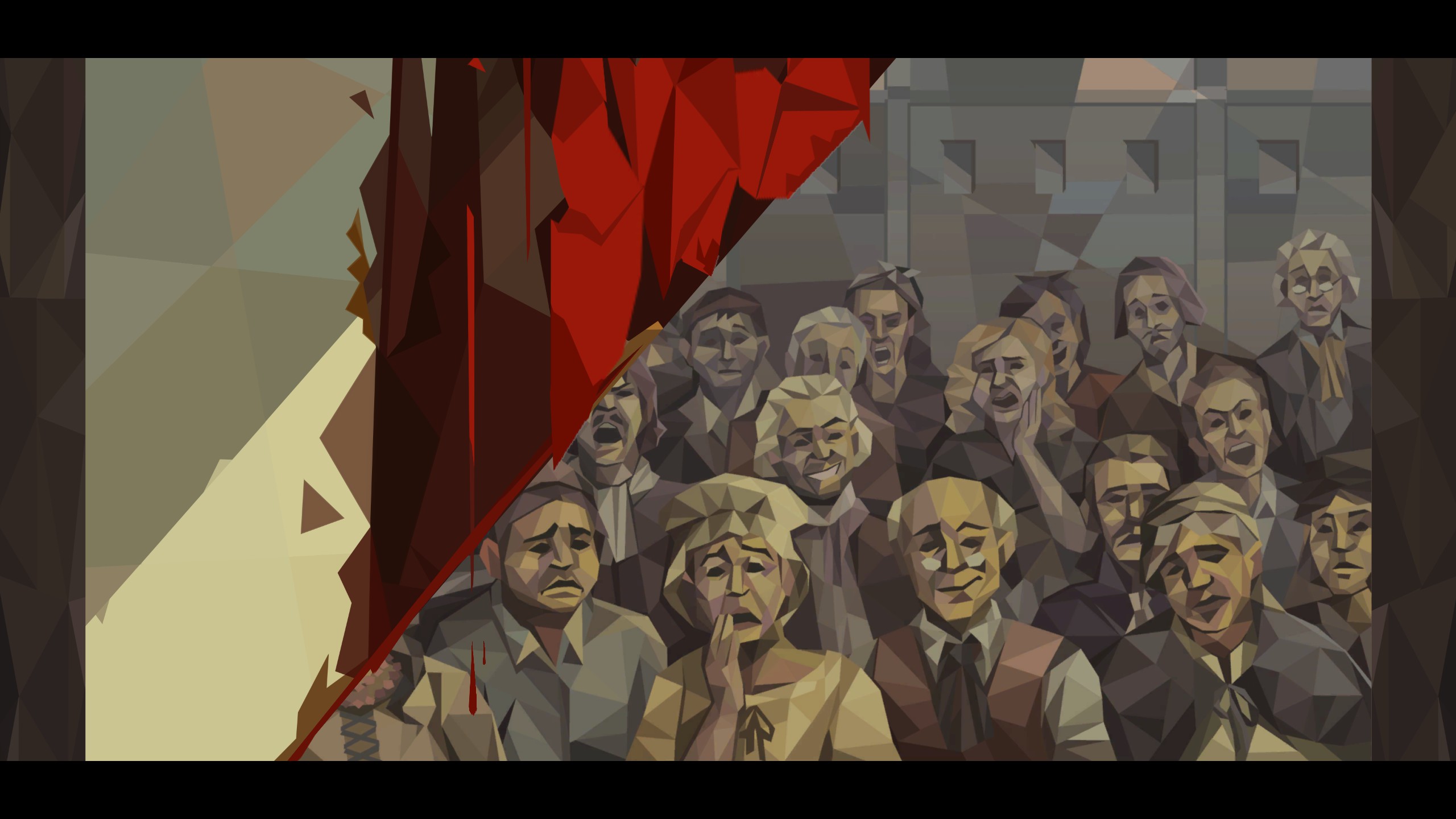We. The Revolution Review
Vive la révolution.

A poor, elderly woman stands before the court, before the French Revolutionary Tribunal. Before me: monsieur le juge, Alexis Fidèle. She’s been accused of breaking into a baker’s shop to steal bread for her starving family. When discovered, she confronted the baker holding a shard of broken glass from his window display. As judge, I questioned her, discovering that the baker had refused to sell to her, that he was stockpiling flour in the face of widespread chaos in Paris.
The woman, confused and desperate in the moment, didn’t mean to threaten the baker, she only wanted bread. I can see that she regrets her actions and that she did it for her family. However, my jury feels the evidence is stacked up against her and the guillotine would be a suitable solution. The aristocracy, too, feel the same way – and I desperately need to regain their favour following previous cases. I weigh up the evidence and the consequences of each choice, then, knowing full well that what I’m doing is more for my own gain than for justice, I send the woman to the guillotine. Finally, I’m forced to pull the rope myself.
Developed by Cracow-based Polyslash, We. The Revolution is a game filled with uneasy decisions and moral dilemmas, with your choices and allegiances at the heart of everything. Taking on the role of an ambitious judge in the midst of the French revolution, you must navigate political intrigue, backstabbings, the wrath of revolutionaries, common folk and even your own family.
Split over three acts, We. The Revolution is layered with systems. I could go into detail about each of them but we’d be here for a long time, just know that each one works to put your actions as the crux throughout this tumultuous period for 18th century France. You’ll be reading case files, intuiting questions, performing interrogations, giving speeches, playing dice, commanding troops and strategizing between districts – all to build your reputation and move upwards in the hierarchy of the revolution.

The courtroom drama of We. The Revolution is the most interesting and engaging. Each day you’re presented with a new case where you must read the case file and then try to figure out which details will open up questions for the defendant. You do this by making connections yourself. You have finite chances to unlock questions by matching up details from the case with different categories (i.e. ‘bloody knife’ with ‘evidence’). Fail in this and you’ll be limited in the questions you can ask, which will affect the outcome of the trial. Unlock all questions and you can play things your way, asking certain things and omitting others to sway the jury and lead the case to a conclusion which benefits you.
All of your actions have an impact on three main groups: the common folk, the revolutionaries and, later on, the aristocracy. Let your reputation with any of these drop too low and you’ll be assassinated. Most cases will see each group split between acquittal, death and prison. Not long into act I, prison is removed as an option, making the balance harder to maintain. Not every case divides the groups – some cases are cut and dry, some line up with all groups’ interests – but playing between all sides makes serving justice a difficult task.
As a game about one of the most violent periods in European history, it pulls no punches. I sent more than a few likely innocent people to death, and many scenarios deal with horrific acts in great detail. Throughout my playtime I was constantly unsettled. The strength of the cases, and their level of depth, variety and attention to detail, is impressive, and it was this day-to-day detective work which I enjoyed more than anything else.

Your family also plays an important role. Between days, you can spend time with your family (or not) on different activities and each choice affects their opinion of you. Each member of your family is fleshed out well and complements the core gameplay, and story. These relationships affect your reputation points, which in turn is reflected by the number of intuition points you have – which can help you make headway in cases. Courtroom tasks (like filling out a report accurately or going against the jury) also affect ‘global modifiers’ which have temporary, yet drastic, effects on your reputation. As I said, there are a lot of systems at play here, but thankfully each one is clearly explained to you as you go. It feels intimidating at first, but you quickly get accustomed to it.
You’ll also be given decisions to make for certain events that occur outside of court, and partway into the first act, you’re given ‘minor cases’ to work through. These are simply single paragraphs outlining the case, and you drag and drop the offender’s name into the ‘acquittal’ or ‘guillotine’ column. This is a good way of scraping back points with each group, while also making you feel like an absolute monster at the same time. Mechanics and narrative are perfectly balanced throughout.
All of these decisions and mechanics feed into each other really well, and you’re always forced to pay close attention to everything that goes on day by day. The overall story regarding the revolution and its swathe of political maneuvering is delivered well through a gorgeous, graphic novel-esque presentation. And Fidèle’s personal journey through the hierarchy is unfurled through ‘intrigues’, a series of decisions where you manipulate, betray, spy and investigate to gain leverage. These break up the pace nicely and rely completely on your ability to weigh up each situation carefully and make the smartest choice.

However, as I got further into the story, I felt like my agency of Fidèle lessened; I didn’t need to pay quite the same amount of attention as I had been doing earlier on. And, without significant knowledge of the French Revolution, I found it tough to keep up with each and every character and their allegiances. Plenty of these are taken from real life, and I can imagine someone who knows their stuff being able to dig much deeper into this aspect of the story and get a great deal from it.
I encountered a few instances of missing audio and spelling mistakes, but nothing major. I’d still like to see this cleaned up, though, as it does take away from the otherwise fantastic delivery in terms of artwork, music and writing – though voice acting leaves something to be desired.
We. The Revolution confidently handles a wide range of complex gameplay mechanics, setting them against a powerful backdrop. Thematically and gameplay wise, everything works. Some systems are more enjoyable than others but they all have their place, taking you on a bloody, morally bankrupt journey that asks difficult questions and makes you live with your answers.
[Reviewed on PC]
